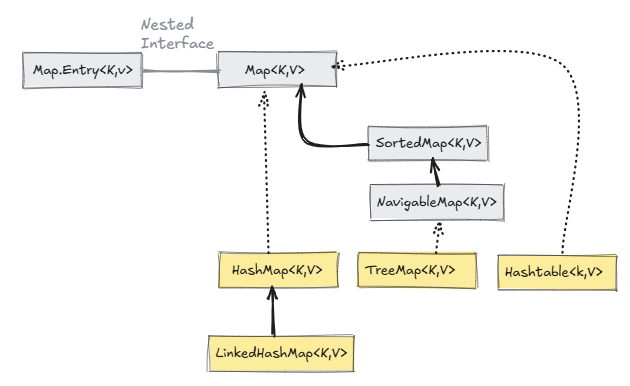Map Interface
Map does NOT extend the Collection interface. It stores value in key-value pairs and both key and value must be objects ( not primitives ).

Basic Map Methods
put(K key, V value);
get(Object key);
remove(Object key);
containsKey(Object key);
containsValue(Object value);
size();
isEmpty();
putAll(Map<? extends K, ? extends V> map);
clear();
Set<K> keySet(); // All keys
Collection<V> values(); // All values
Set<Map.Entry<K,V>> entrySet(); // All entries
Map.Entry Interface and Iterating a Map
Each key-value pair is represented by an inner interface object. It is used when traversing via entrySet() since Map is not iterable.
interface Entry<K,V> {
K getKey();
V getValue();
V setValue(V value);
}
Iterating through a map
for (Map.Entry<String, Integer> entry : map.entrySet()) {
System.out.println(entry.getKey() + " " + entry.getValue());
}
Hashmap Class
- Unordered map (no insertion or sorted order)
- It allows 1 null key and multiple null values
- It is not thread safe.
Map<Integer,String> map=new HashMap<Integer,String>();
// Size
map.size();
// Add elements to map
map.put(1,"arjit");
map.put(2,"farhan");
// Checking if Key present
map.containsKey(1);
// Traversing
for(Map.Entry m : map.entrySet()){
System.out.println(m.getKey()+" "+m.getValue());
}
// removing elements
map.remove(100);
// replacing
map.replace(101,"Vijay","Ravi");
LinkedHashMap Class
- Maintains insertion order.
LinkedHashMap<Integer, String> map = new LinkedHashMap<>();
map.put(1, "One");
map.put(2, "Two");
System.out.println(map); // Preserves insertion order
TreeMap Class
- Sorted map (by keys, ascending order by default)
- Based on Red-Black Tree
- Does not allow null keys
TreeMap<Integer,String> map=new TreeMap<Integer,String>();
map.put(100,"Amit");
map.put(102,"Ravi");
map.remove(100); // remove element
map.descendingMap(); // descending order
map.headMap(102);
map.containsValue("Amit");
map.containsKey(100);
//Traversal
for (Map.Entry<Integer, String> e : map.entrySet())
System.out.println(e.getKey() + " " + e.getValue());